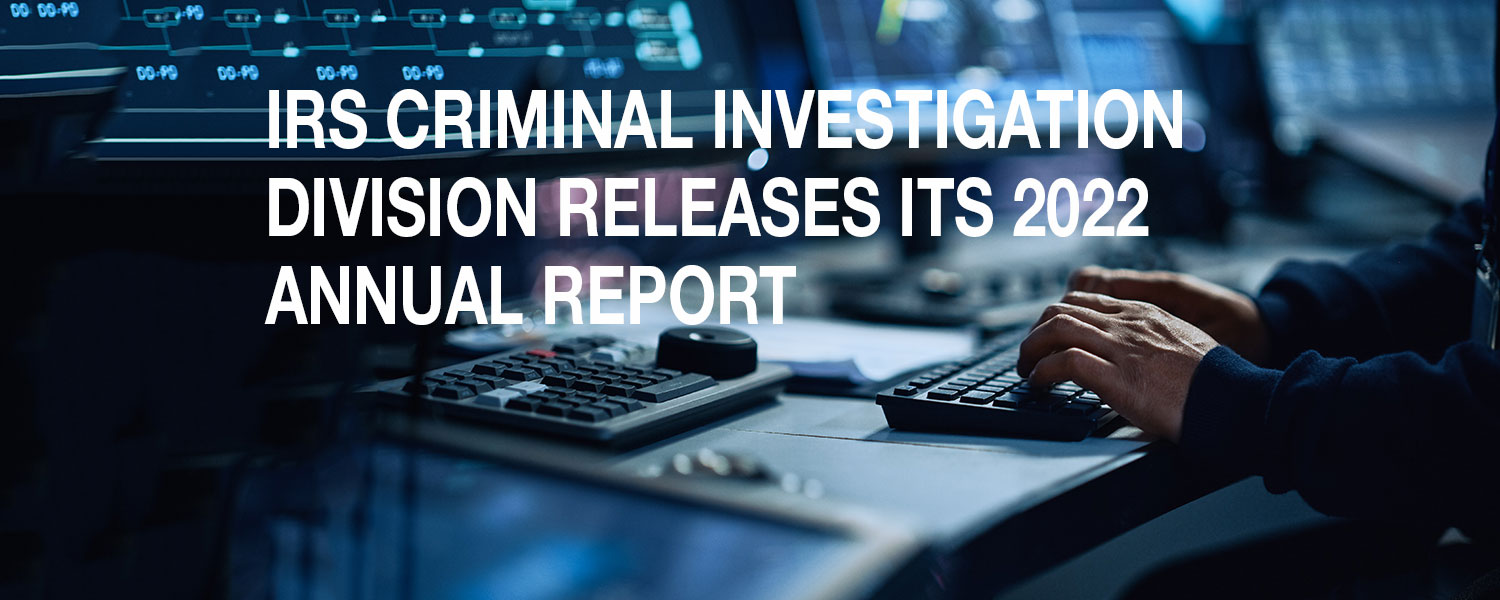Getting Ready For Tax Season 2023 – What You Need To Know About Reporting Cryptocurrency.
Cryptocurrency / Bitcoin – Is this the 21st century answer to hiding assets in Swiss bank accounts?
The IRS thinks this is the case which is why the IRS has stepped up its investigation efforts to uncover non-compliant taxpayers just like the IRS successfully did in its investigation of the Swiss banks leading Congress to enact the Foreign Account Tax Compliance Act (“FATCA”). FATCA forces foreign banks to disclose information on U.S. account holders which the IRS receives and matches the information reported by U.S. taxpayers. No longer can taxpayers avoid reporting income on their foreign bank accounts. No longer can taxpayers avoid disclosing their foreign bank accounts.
With more businesses willing to accept and transact in cryptocurrencies, the absence of specific rules related to the reporting of business income from cryptocurrency transactions has created a “tax gap” that the IRS intends to close.
The IRS now groups cryptocurrency, convertible virtual currency, stablecoins and non-fungible tokens (NFTs) as “digital assets”.
How To Report Cryptocurrency On Your 2022 Income Tax Return.
The IRS treats cryptocurrencies like property, meaning that anytime you spend, exchange, or sell your cryptocurrency, you create a taxable event. So just like stocks, you would look at how much you paid for your cryptocurrency, which is the cost basis, and the market value at the time you spent it or sales price when you sold it. That difference if disposed at a gain is subject to tax. If disposed at a loss, that loss can offset your capital gains. You would report these transactions on Form 8949, Sales And Other Dispositions Of Capital Assets.
In determining the cost basis of the cryptocurrency disposed, you get to pick and choose which cryptocurrency acquisition was the source of the disposition. To show the smallest gain (or largest loss), you should pick the most expensive acquisition of that cryptocurrency later disposed. This accounting method is known as “HIFO” accounting. HIFO stands for “highest in, first out”. By keeping detailed records of your cryptocurrency transactions and cost basis to employ this method of accounting, a taxpayer should be able to save on taxes.
How IRS Targets Cryptocurrency.
The IRS has one of the most extensive data collections in the world. Traditionally its power to enforce has come through the matching of data. For example, you received a W-2 Form from your employer showing how much you earned. That same form is submitted by your employer to the IRS. Now the IRS can match your return to that form to make sure you are reporting the income. The same thing goes for 1099 forms showing your earnings from miscellaneous income, gambling winnings, interest and dividend income, sales of assets, deductions, and so on.
But with Bitcoin and other cryptocurrencies, there is no such third-party reporting. Digital exchanges are not broker-regulated by the IRS. Exchanges do not issue a 1099 form, nor do they calculate gains or cost basis for the trader.
On May 20, 2021, U.S. Department Of Treasury released a report that included a set of proposed tax compliance initiatives with the goal of closing the gap between taxes owed and taxes actually paid. These measures are encompassed in the American Families Plan, which establishes rules for the proper reporting of cryptocurrency including a new rule that would require businesses to file a current transaction report when they receive cryptocurrency worth more than $10,000, just as most businesses are required to report cash payments in these amounts.
On August 10, 2021, H.R. 3684, known as the Infrastructure Investment and Jobs Act, was passed by the Senate. Although this bill has yet to be considered by the House of Representatives, it includes a provision that would require broker reporting of crypto-asset transfers. Section 80603 of the bill imposes new crypto-assets information reporting requirements on brokers. The Sec. 6045(c)(1) definition of “broker” is expanded to include anyone who for consideration effectuates “transfers of digital assets on behalf of another person”. For these purposes, “digital asset” is defined as “any digital representation of value which is recorded on a cryptographically secured distributed ledger or any similar technology.” Furthermore, the bill would amend Sec. 6045A to require brokers to provide information returns reporting any transfers of digital assets to accounts that are not maintained by a broker.
But the IRS does not stop there …
Chainalysis Reactor Software
The IRS and other federal agencies want to catch up on, and make sense of, the worldwide web of bitcoin and other cryptocurrencies. Chainalysis is a company that created a cryptocurrency-tracing software dubbed “Reactor” which is being used by at least 10 federal agencies including the IRS. The IRS Cyber Crimes Unit (CCU), a five-year-old division of its larger Criminal Investigation (CI) wing and the leader in the IRS’ cryptocurrency crimes investigations, uses this software as a tool to help identify taxpayers who could be non-compliant in the tax laws or involved in criminal activity.
Virtual currency is an ongoing focus area for IRS Criminal Investigation.
In 2018 the IRS announced a Virtual Currency Compliance Campaign to address tax noncompliance related to the use of virtual currency through outreach and examinations of taxpayers. The IRS will remain actively engaged in addressing non-compliance related to virtual currency transactions through a variety of efforts, ranging from taxpayer education to audits to criminal investigations.
IRS Access To Cryptocurrency Transactions.
A John Doe Summons issued by IRS was ruled enforceable by U.S. Magistrate Judge Jacqueline Scott Corley in November 2017 (United States v. Coinbase, Inc., United States District Court, Northern District Of California, Case No.17-cv-01431). Coinbase located in San Francisco is the largest cryptocurrency exchange in the United States. Under the order, Coinbase will be required to turn over the names, addresses and tax identification numbers on 14,355 account holders. The Court has ordered Coinbase to produce the following customer information: (1) taxpayer ID number, (2) name, (3) birth date, (4) address, (5) records of account activity, including transaction logs or other records identifying the date, amount, and type of transaction (purchase/sale/exchange), the post transaction balance, and the names of counterparties to the transaction, and (6) all periodic statements of account or invoices (or the equivalent).
ON MARCH 16, 2018 COINBASE COMPLIED WITH THIS SUMMONS AND TURNED OVER DATA OF 14,355 ACCOUNT HOLDERS TO IRS.
Now while this net may not pick up taxpayers whose accounts have less than $20,000 in any one transaction type (buy, sell, send, or receive) in any one year from 2013 to 2015, it should be clear that this is the first step for the IRS to crush non-compliance for all taxpayers involved with cryptocurrency just like the IRS was successful in battling taxpayers having undisclosed foreign bank accounts.
10,000 Cryptocurrency Owners Receiving Warning Letters From The IRS
After years of analyzing data from third parties involved in the cryptocurrency exchanges, the IRS announced in a press release on July 26, 2019 that it has started sending letters to cryptocurrency owners advising them to report their cryptocurrency transactions and pay their taxes. More than 10,000 taxpayers have been identified by IRS as being involved in cryptocurrency transactions but who the IRS believes may not have been compliant in reporting these transactions on their tax returns.
Taxpayers who do not properly report the income tax consequences of virtual currency transactions are, when appropriate, liable for tax, penalties and interest. In some cases, taxpayers could be subject to criminal prosecution.
Notices Being Sent To Taxpayers Are The First Step In IRS Enforcement Action
The IRS is using three types of notices to send to more than 10,000 taxpayers by the end of August 2019 – notices 6173, 6174 or 6174-A. All three notices indicate the IRS has information that the taxpayer receiving the notice currently has or has had virtual currency. However, it is Letter 6173 that is most serious as it requires a signature from the recipient under perjury that they are compliant with the U.S. tax code or requiring taxpayers to respond to the IRS and either file delinquent returns for tax years 2013 through 2017 or amend previously filed returns and include the applicable forms or schedules reporting cryptocurrency transactions. If you receive a Letter 6173, it should be a virtual certainty that you will be selected for examination.
If you receive Letter 6173, you should consult with a tax attorney as the submission of a statement signed under penalties of perjury that is false can result in serious consequences including criminal prosecution.
Form 1040 Makes It Harder For U.S. Taxpayers To Avoid Non-compliance Or Claim Ignorance.
On the 2022 Form 1040, you are required to answer the following checkbox question:
At any time during 2022, did you: (a) receive (as a reward, award or payment for property or services); or (b) sell, exchange, gift or otherwise dispose of a digital asset (or a financial interest in a digital asset)? ◊ Yes ◊ No
Taxpayers will now be required to check the appropriate box to answer the virtual currency question. This question has been on individual income tax returns starting with 2019; however, the term “digital assets” has replaced “virtual currencies,” a term used in previous years. This requirement is similar to how the IRS includes questions on Schedule B inquiring whether a taxpayer has foreign bank accounts.
Normally, a taxpayer must check the “yes” box if they:
- Received digital assets as payment for property or services provided;
- Transferred digital assets for free (without receiving any consideration) as a bona fide gift;
- Received digital assets resulting from a reward or award;
- Received new digital assets resulting from mining, staking and similar activities;
- Received digital assets resulting from a hard fork (a branching of a cryptocurrency’s blockchain that splits a single cryptocurrency into two);
- Disposed of digital assets in exchange for property or services;
- Disposed of a digital asset in exchange or trade for another digital asset;
- Sold a digital asset; or
- Otherwise disposed of any other financial interest in a digital asset.
Normally, a taxpayer who merely owned digital assets during 2022 can check the “No” box as long as they did not engage in any transactions involving digital assets during the year. They can also check the “No” box if their activities were limited to one or more of the following:
- Holding digital assets in a wallet or account;
- Transferring digital assets from one wallet or account they own or control to another wallet or account they own or control; or
- Purchasing digital assets using U.S. or other real currency, including through electronic platforms such as PayPal and Venmo.
Taxpayers who answer “no” and for who the IRS later determines should have answered “yes” could face civil or criminal penalties and it could affect their success in having penalties abated for reasonable cause.
Penalties For Filing A False Income Tax Return Or Under-reporting Income
Failure to report all the money you make is a main reason folks end up facing an IRS auditor. Carelessness on your tax return might get you whacked with a 20% penalty. But that’s nothing compared to the 75% civil penalty for willful tax fraud and possibly facing criminal charges of tax evasion that if convicted could land you in jail.
Criminal Fraud – The law defines that any person who willfully attempts in any manner to evade or defeat any tax under the Internal Revenue Code or the payment thereof is, in addition to other penalties provided by law, guilty of a felony and, upon conviction thereof, can be fined not more than $100,000 ($500,000 in the case of a corporation), or imprisoned not more than five years, or both, together with the costs of prosecution (Code Sec. 7201).
The term “willfully” has been interpreted to require a specific intent to violate the law (U.S. v. Pomponio, 429 U.S. 10 (1976)). The term “willfulness” is defined as the voluntary, intentional violation of a known legal duty (Cheek v. U.S., 498 U.S. 192 (1991)).
And even if the IRS is not looking to put you in jail, they will be looking to hit you with a big tax bill with hefty penalties.
Civil Fraud – Normally the IRS will impose a negligence penalty of 20% of the underpayment of tax (Code Sec. 6662(b)(1) and 6662(b)(2)) but violations of the Internal Revenue Code with the intent to evade income taxes may result in a civil fraud penalty. In lieu of the 20% negligence penalty, the civil fraud penalty is 75% of the underpayment of tax (Code Sec. 6663). The imposition of the Civil Fraud Penalty essentially doubles your liability to the IRS! And this is why the IRS is first sending Letter 6173 requiring a signature from the recipient under perjury that the taxpayer is compliant with the U.S. tax code BEFORE the IRS then decides to audit the taxpayer.
Voluntary Disclosure – The Way To Avoid Criminal Fines & Punishment
The IRS has not yet announced a specific tax amnesty for people who failed to report their gains and income from Bitcoin and other virtual currencies but under the existing Voluntary Disclosure Program, non-compliant taxpayers can come forward to avoid criminal prosecution and negotiate lower penalties.
What Should You Do?
With only several hundred people reporting their crypto gains each year since bitcoin’s launch, the IRS suspects that many crypto users have been evading taxes by not reporting crypto transactions on their tax returns. And now that like-exchange treatment is prohibited on transactions that occur after 2017, now is the ideal time to be proactive and come forward with voluntary disclosure to lock in your deferred gains through 2017, eliminate your risk for criminal prosecution, and minimize your civil penalties. Don’t delay because once the IRS has targeted you for investigation – even it’s is a routine random audit – it will be too late voluntarily come forward.
Take control of this risk and engage a bitcoin tax attorney at the Law Offices Of Jeffrey B. Kahn, P.C. located in Orange County (Irvine), the Bay Area (San Francisco, San Jose and Walnut Creek) and other California locations. We can come up with solutions and strategies to these risks and protect you and your business to mitigate criminal prosecution, seek abatement of penalties, and minimize your tax liability. Also, if you are involved in cannabis, check out what our cannabis tax attorney can do for you.











